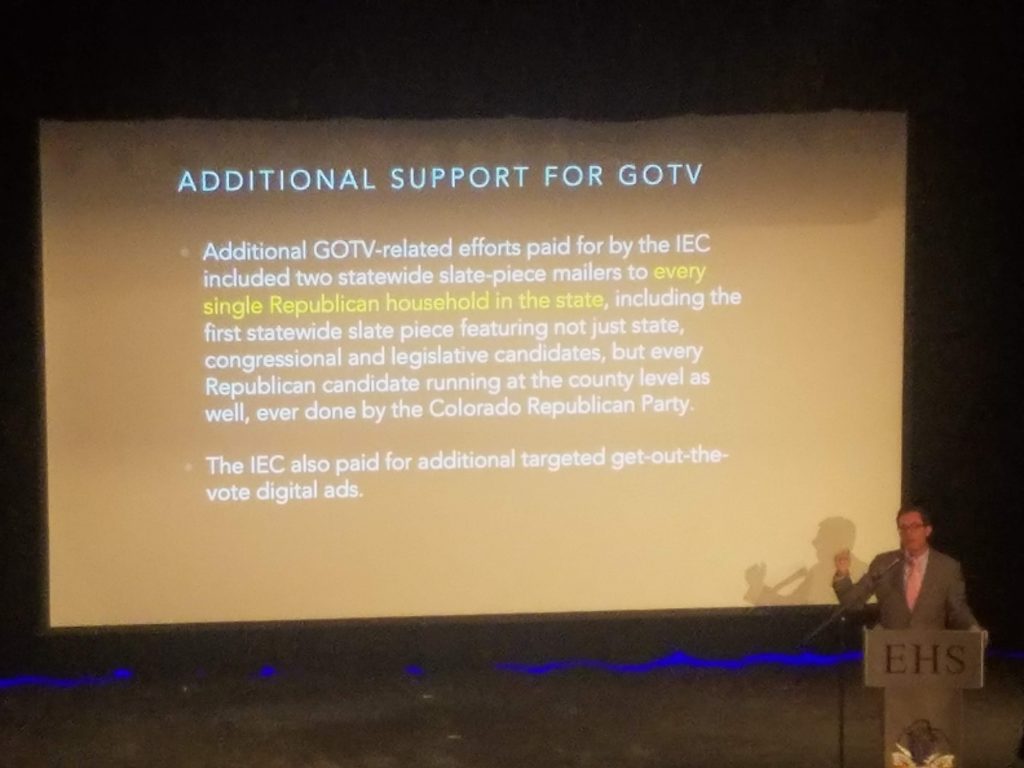A dispute has emerged among Colorado Republicans about how much to rely on a giant database of voter information developed over many years with billions of dollars by the Koch brothers, the GOP’s mega donors.
The Koch database, called i360, is heralded by many Republicans as a beautiful tool to target voters across the country, including Colorado, using information gleaned from consumer spending (from credit agencies and vendors), social media, canvassing by Americans for Prosperity and others here in Colorado, and other places where big data sources.
Just before last year’s election, Salon called i360 an “unprecedented propaganda” tool identifying more than 199 million active voters and 290 million U.S. consumers, with about 2,000 data points on each person, such as “your vitals, ethnicity, religion, occupation, hobbies, shopping habits, political leanings, financial assets, marital status and much more.”
“They know if you enjoy fishing — and if you do, whether you prefer salt or fresh water. They know if you have bladder control difficulty, get migraines or have osteoporosis. They know which advertising mediums (radio, TV, internet, email) are the most effective,” according to Salon.
But for former State Sen. Tim Neville (R-Littleton), the promise of i360 doesn’t match the reality, which led Neville, in part to reject pressure from the Colorado Republican Party (and its consultants) last year to use the party’s voter data to target voters in his (mostly) Jefferson County district, according to sources.
They say the state party’s data, which included i360 information purchased on multiple occasions beginning back in 2012 and augmented with other data, was really bad, causing the campaign to waste scarce time and money by regularly sending canvassers to the doors of hostile voters.
So Neville, apparently joined by Jeffco state senate candidate Tony Sanchez and state house Republican candidates, used different voter-targeting data, from competing consultant vendors, assembled through multiple sources, including some i360 inputs.
In the end, among the three highest priority state senate races in Colorado last year, Neville and Sanchez did only slightly worse than Christine Jensen, who used i360 from the state GOP in her state senate race. Neville lost by 14 points, Sanchez by 16, and Jensen by 12, handing control of state government to the Democrats.
The performance of Neville and Sanchez is eye-popping given the disproportionate resources that flooded the Jensen campaign. Neville himself raised the most money of the three candidates,
But conservative independent groups lavished money on Jensen, dropping about $3.2 million on her campaign versus $1.5 million for Neville and 1.2 million for Sanchez, according to TRACER campaign records, some media buys, and some other information. The GOP failed candidate over in Adams County, Beth Martinez Humenik, got about $3.8 million. These aren’t exact figures, but they give you an idea of the spending by GOP-allied groups.
After November’s election, Republican activists aligned with Neville started crunching numbers and criticizing the state party, consultants, and campaign groups for executing amateur campaign tactics.
They slammed alleged cut-and-paste mailers with glam photos making Democratic state senate candidates Brittany Pettersen, Tammy Story, and Faith Winter look like movie stars. Not only were the mailers awful, they say, but multiple iterations of the ads were sent to dedicated Republicans who hadn’t missed an election in decades.

They point to a power point presentation in which Ryan Call, of the Colorado Republican Party’s independent campaign group, bragged about twice sending “slate-piece mailers to every single Republican in the state.”
While the GOP’s ineffective mailers littered porches and yards across Denver’s suburbs, say the GOP critics, Republican groups, including the Senate Majority Fund, failed to match—in resources and sophistication–the Democrats’ canvassing, voter-identification, and get-out-the-vote efforts.
Colorado Republicans had plenty of money, they say, pointing to reports on campaign spending, but they wasted their resources on cozy consultants, who sell voter data and don’t share it, too much direct mail, and excessive overhead.
In response to the criticism, which is still rampant on Republican social-media platforms and conservative talk radio shows, a defense of i360 and its use in the Colorado Republican Party’s and GOP groups’ voter-targeting software, was presented in a document, authored, according to a source, by former Republican lawmaker Matt Knoedler, who’s now a senior policy adviser at Squire Patton Boggs in Denver.
In his memo, Knoedler, who did not return multiple calls for confirmation and comment, offered a detailed and spirited defense of i360, responding to the critics by emphasizing that i360,along with the other data used, provided “solid data.”
“I’ll bet no-one else in the country adds that much data to the pool,” wrote Knoedler.
“This data/canvassing operation helped the GOP win the State Senate in 2014 and held it in 2016 despite Clinton and Bennet winning statewide,” he concluded. “In my opinion, it would be a shame to replace the canvassing data from a smaller, non-networked vendor, especially one that does have unique, legislative-specific data on voters in these key districts.”
Acknowledging the dispute within the GOP, Knoedler wrote: “In 2018, the State House GOP’s new leadership team chose to use a different data source and to not share operational costs with the Senate. I assume the House 527 did some canvassing, but don’t have access to those metrics.”
“It’s worthwhile to debate how we use the data, and how we could improve upon it,” states the memo by Knoedler.
The resolution of this debate is urgent, in part because Republicans are drawing on their voter data as they gear up for recall elections
In fact, some Republicans, like state house Republican leader Patrick Neville, make the argument that part of the value of the recall elections is to force Republicans to upgrade their voter-targeting data.
“We definitely need some help with the ground game,” Patrick Neville said on KNUS Chuck and Julie May 6. “The biggest thing we have to do is start now and start early. That’s why I think the recalls are appropriate too, because they give us the ability to start gathering that data for some of those competitive seats early and often like Democrats do.”
Neville thinks the data harvested during the 2013 campaign to recall State Sen. Evie Hudak, who resigned in 2013 as the recall appeared be successful, led to the victory of Republican Laura Woods in the district in 2014.
“What we did is, we took all that data and all that information we gathered from those voters in that district [during the attempt to recall Hudak], and we used it to win in the next election cycle,” said Neville on air. Patrick’s brother Joe Neville, who ran the GOP state house effort last year, also ran the Hudak recall.
“The problem was, the election cycle after that, we went home and we didn’t keep working the district. We have to keep it up on a year-round basis.”
That’s what Republicans are doing now. At a “recall training” seminar in Buena Vista April 11, Ben Engen from Constellation Political explains how the voter data is collected, using the “walk app” provided by the Colorado Republican Party.
“It’s an application for your phone,” said Engen in the video of the training. “They will load a list of potential voters on there. You can open it on your phone, and it will say, ‘Go to this house. There’s a person here. This is their voter file information.’ Ask them if they want to sign. It’s a way for you to look up that voter registration information.”
But the question is, will the list of potential voters given to Republican activists turn out to be Democrats hopping mad at Trump? Have the deep-pocketed Koch brothers—or the Republican Party–figured out a way to fix its voter information? Was it broken in the first place? Or, as some Republicans are now asking, is it the Colorado Republican Party that’s broken, not its big database?




